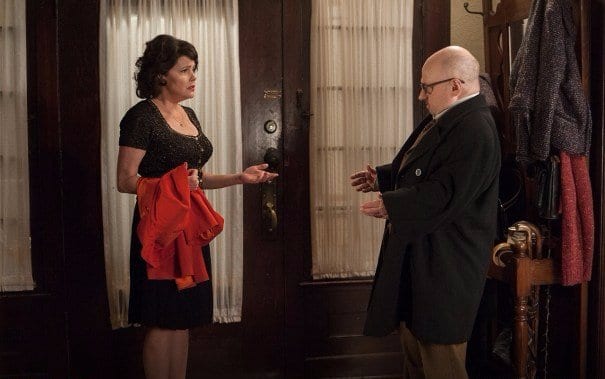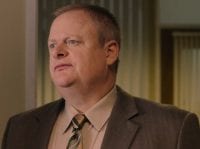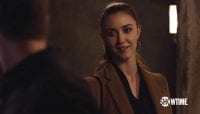“You asked about this shovel,” Nadine says to Ed in the opening scene of Part 15 of The Return. “Well, I’m shoveling myself out of the shit!”
“Have you been watching that show of Jacoby’s?” Ed drawls.
Nadine’s grin says it all. “You know I have,” she replies, before “freeing” Ed to pursue Norma, as they are finally able to truly consummate the love they shared for one another and held on to for all these years.
Much ink has been spilled over the last year about the role of Dr. Jacoby and his magical golden shit-shovels — and nowhere more eloquently than in the columns of our own John Bernardy, who has written extensively on the subject in his Electricity Nexus series — but it is never more clear than in Part 15 that metaphorically shoveling yourself out of the shit is the precise moral statement that underpins the whole of The Return. Those who succeed in doing so succeed in achieving happiness that eludes those who can’t.
While played for laughs, Jacoby’s Internet show is — I believe — a very important thematic cornerstone throughout the season. Here, we have Nadine recognising the baggage she has heaped on her “big lug” of a husband and which has kept him from fulfilling his potential with the great romantic love of his life. When he goes to tell Norma, at first we’re led to believe that this ship has long since sailed, leaving Ed to wallow at the counter while she entertains her business (and romantic?) partner, Walter; but in fact it seems as though Norma too is digging herself out of her own shit. So far we’ve only seen her a few times, and the majority of those times she’s been buried under paperwork, her adding machine at her side, clearly not enjoying her newfound role as franchise owner. In exercising her buyout option and returning to just the one diner, the shit has been shovelled; she slides her hand over Ed’s shoulder and ends his long suffering as well as ours.
The fact that this scene ends on a swelling Otis Redding crescendo and a lingering shot of blue skies and cotton candy clouds cannot be overstated. This is as close as we get to a happy ending until Part 18 reunites the Jones clan in Las Vegas.
It doesn’t last. The next scene devolves into screeching electrical noises and ink-black skies as we follow our prime antagonist to the most frightening and alarming of places: the Convenience Store. Mr. C is close — he finds Jeffries at the Convenience Store, and is tantalisingly led down a path that gets him as near to Judy as he’s probably ever been — but he can’t quite make it to the end of this story. Not yet. None of us know what Jeffries’ motives are here, and certainly during the original run of The Return we had no clue whose side he was on, not until the very last hours. But even taking that twist from Part 17 into account and recognising that perhaps Jeffries has been playing Mr. C through this entire scene and has no intention of helping him find Judy at all, its still interesting to imagine a scenario in which Mr. C wasn’t so consumed by his wants and was more level-headed about his goals. For him, the shit he’s digging out of is of his own making: he doesn’t want to go back to the Black Lodge, and so he’s orchestrated a way to get out of that contract. It’s simple, but it’s led to nothing but trouble.
He does have an interesting meet-cute with his son, Richard Horne. The long tease of who Richard’s parents were was at an end, as no one could use narrative ambiguity to claim that Richard was adopted, or Johnny’s son, or the product of some illegitimate relationship with one of the One Eyed Jack girls and raised as a Horne grandson, or whatever. No, Richard comes right out and says that his mother is Audrey, and the clues planted back in his debut scene at the Roadhouse and the conversation with Doc Hayward about Cooper being at the hospital to visit Audrey in the days after the bank explosion lead us to no other conclusion about Richard’s parentage (and Part 16 all but spells it out for us: Mr. C raped Audrey.) It’s horrible to imagine, but there it is. And there Richard is, being laid out by Mr. C and forced to drive him on the weirdest father-son road trip in recent memory.
(I also wanted to point out something I noticed on this rewatch that I missed before: Jeffries says to Cooper “So…you are Cooper.” This is a surprise to him, or it seems to be, and since we also saw a flashback to Jeffries in Fire Walk With Me, a scene in which Jeffries seems to be accusing Cooper of not being who he claims to be, it’s interesting that his true identity is being brought up here again. Had FWWM Jeffries already met and had dealings with Mr. C at some point during his absence from the 1988/1989 time frame? And was his hesitation to be upfront with Mr. C now a result of his uncertainty over the double’s true identity persisting until this day? And what does it mean if you point to an evil double of a righteous man and say “You are him”? In my opinion, it backs up the old theory John Thorne first put to paper in Wrapped in Plastic, that Cooper was split in the Lodge and his evil half — the part of him that wanted things, that killed people, that couldn’t help but desire Audrey to the point of sexual assault — got out. Evil things were done. But it was still half of Cooper that did them. It’s a chilling thing to consider…)
Interesting that Jeffries says “So…you ARE Cooper.” Followed by a closeup on Mr C.
Mr C and Cooper are one and the same; not a double, not doppelgänger, but split from the same person. @25YLSite #ReturnRewatch
— Lindsay Stamhuis (@linzstam) 20 August 2018
We saw at the top of the hour what happens to people who dig themselves out of the shit; what happens to those who can’t? In Stephen Burnett and Gersten Hayward, we see two people who are completely out of their depths in their ability to realise the danger of their situation, whatever that is — we don’t even know what is happening with them or why, although drugs are likely to blame; Stephen’s mad mumbling and Gersten’s frenzied clawing at her own hair are proof enough of that. Does Stephen end his life with that gunshot blast we hear off screen? It doesn’t really matter. We’ve seen enough of him to know that whatever happened wasn’t going to be happy. The fact that he took Gersten down with him to these depths of despair is a tragically sad note to end their story on. What could it have looked like had they dug themselves out of the shit? It’s hard to say. But it wouldn’t have led them to a damp patch of forest with a gun between them.
One of the strangest scenes for me to watch the first time around was the first moment at the Roadhouse. While a jukebox plays ZZ Top’s “Sharp Dressed Man”, James and Freddie arrive, ostensibly for anoter post-work drink. But really James’s ulterior motive is to see Renee, a woman he’s sweet on. At first, it seems like this isn’t going to pan out well — James is interrupted by Renee’s husband, who attacks James, prompting Freddie to swing into high gear, green-fisted glove and all, and landing the pair in jail (while their unsuspecting victims wind up in intensive care). But in hindsight, this is really an important moment for the culmination of the story and I have a hard time not viewing this another shit-digging example: if James hadn’t dug himself out of the shit and screwed up the courage to talk to Renee, her husband wouldn’t have attacked him, Freddie wouldn’t have defended him, and they wouldn’t have ended up in jail to be ready for the precise moment when BOB and Mr. C make their unholy return to Twin Peaks. Now you could argue that this was an event pre-ordained by the Fireman, who seems capable of altering events as he sees fit. But it still required James to make that first step, and that seems like it might be important to note.
A few quick scenes followed this, and seem to be darkly comic relief upon first glance. Las Vegas FBI Agent Wilson’s bungling of their search for the Jones family leads to a funny moment that truly never fails to make me laugh, as Agent Headley loudly repeats Wilson’s assertion about the Jones family’s kids. Kids-AH. PLURAL. Maybe there’s a shit-digging moment to be discovered here, but I’m still giggling so I can’t find it yet.
The assassination of Todd and Roger — foreshadowed by Mr. C’s cryptic text about Las Vegas earlier in the episode — had its own comic undertones, as the two serious characters are interrupted by a beautiful Louboutin-heeled Chantal, who shoots them both dead and can’t wait to clear the lobby of the building before placing her fast food order with Hutch.
(I know many have commented on the glitches in the past, and there is one here in this episode — when Todd is shot, and his head glitches for a moment — but I don’t feel I can do the discussion justice here. Are they artefacts from parallel worlds bleeding through into the one we’re seeing, a la the timequake theory? Are they evidence of Lodge interference? Are all these individuals and moments the result of tulpas? I can’t say, but the fine people of the Twin Peaks subreddit might be able to help you out if you’re interested in learning more.)
Now what happens next seemed to me to be the climax of the episode, and I was somewhat surprised to re-discover that it happened before the end of this Part. DougieCooper shocking himself with the fork in the electrical socket was a — pardon the pun — shocking way for Cooper’s reemergence to occur. In hindsight, I can’t say that it wasn’t executed perfectly; I don’t think there could have been a better moment for this to happen. I found myself this time around feeling sorry for Janey-E, who has seen her husband transform from boorish schlub to sharp-dressed man, and whose dreams are finally coming true for her and her family. She doesn’t know that things are about to get infinitely weirder before they return to some semblance of normal.
It seems to be the common assumption that Cooper’s personality and memories were subsumed by Dougie to a certain extent, hiding deep until this moment, when the electrical shock jolts him out of it. I wanted to believe for so long that Cooper was shining through — as we saw earlier with the sparkling lights on the case files, or the green light on Anthony’s face that told us he was a liar, or the instinct that forced Ike the Spike to the pavement — and struggling to reassert himself after being buried for so long within a virtually vegetative body. Was this an example of that? Sure, it’s chance and not design that turns the TV on when Dougie mashes his fingers against the remote control; and yes, it’s chance that the channel was set to Sunset Blvd., and that it just happened to be at this part of the film — at that iconic line from Cecil B. DeMille to “Get Gordon Cole!” — when the TV turned on. And maybe the powers that be have orchestrated this to perfection, as they did with Freddie and the jail cell. But I think there’s has to be an element of choice here. And if that’s the case, was this also an example of Cooper digging himself out of the shit that is the mind of Dougie Jones? If that’s the case, there was still a lot of shit for Cooper to dig through, so much so that it took 12 Parts for us to get here, but finally we have a breakthrough…and we all know what happens in Part 16, don’t we?
The next moment, while we were still high on the charge — again, sorry about the pun! — from Dougie’s little science experiment, we get to the end of the Log Lady’s sojourn. I have long wondered if her demise was the necessary next step in Deputy Hawk ascension to resident sage of Twin Peaks. There is a kind of release that comes when you acknowlege the situation at hand for what it is. It might also be a reminder that sometimes you can’t dig yourself out of the shit but must simply recognise that you’re in it, and do the best that you can. In telling Hawk that she’s dying, Margaret passes the torch to Hawk in a way that seemed destined to happen from as far back as Season 1 of the original Twin Peaks. For real-life reasons involving Catherine Coulson’s illness and subsequent death, her role could not be as prominent as I suspect Lynch and Frost would have wanted it to be, but in Hawk they had a character ready-made to fill the void that she would leave behind. Certainly, with his map-making and tracking evidenced in earlier Parts, Hawk was up to the task; but it took Margaret to formally acknowledge the elephant in the room for Hawk’s importance to shine through. There’s no one left to guide him, no more late night phone calls or trips to the cabin for tea. Hawk will be alone on any future quests he makes in search of answers here. But there’s power in realising that. This is the moment Hawk has been training for the whole season; he (and we) just didn’t know it yet.
Now here’s something to ponder: soon after moment when the lights literally go out for the Joneses, the light in Margaret Lanterman’s cabin begins to fade. I hadn’t considered it until watching Part 15 tonight that there might be a link here that goes beyond simple electricity; does the light going out foe DougieCooper had a causative or correlative relationship with Margaret’s death? Are Margaret and Cooper linked somehow? I’d be curious to hear your thoughts.

Finally we get to the end of the episode and the back to back one-two punch of Audrey’s next attempt at getting to the Roadhouse — she made it to the door! And they have their coats on! For a while anyway! — and then we get to the Roadhouse ourselves. As far as shit-digging goes, Audrey seems to be neck-deep in it. Her physical inability to get out the door could be seen as her metaphorical inability to recognise her situation for what it is. Unlike Hawk and Margaret, who need to have their final conversation in order for the log to turn gold and the story to reach the moment of completion, Audrey seems permanently stuck, constipated (as it were) within the fractured narrative in which she has been existing since we first saw her in Part 12. What is at the Roadhouse that is so important? Why does Charlie need to bring her there? We don’t know, but Audrey’s eventual outburst and attack of Charlie seems to be the breakthrough she needs, since the next time we see her in Part 16, she is finally at the destination she’s been seeking…and, again, we all know what happens there.
Tonight at the Roadhouse, however, The Veils perform “Axolotl” — itself an interesting choice, as the reptilian axolotl is an animal known for its regenerative abilities, and who else but Agent Cooper himself is on the path to regeneration? — while a young woman named Ruby is forcibly removed from the booth in which she was sitting by two tough-looking bikers. She crawls along the ground, through the crowd and the legs of the patrons, as the song booms overhead. Eventually, in a state of immense distress, she screams.
It’s worth noting that there is a strobe effect present on stage during this scene, and that in the past we have seen this quite a lot at the Roadhouse. I’ve argued before that the Roadhouse is a grand liminal space; I might even be able to convince myself that nothing we saw in the Roadhouse at all took place in the real world, which might mean that most of this entire season of Twin Peaks was taking place in another world (perhaps it’s just a stranger’s dream). But I think it’s more than a little bit curious that Ruby and Cooper are both pictured crawling on the floor in this episode; they both receive a shock that affects illumination around them; and a scream is present in both moments. Is this evidence that we are supposed to view these two scenes as intersecting or overlapping or linked in some way? Maybe, but maybe not. Or maybe not consciously. Still, I like the theory that the Roadhouse exists in some other realm, a place just beyond this one, that looks and smells and tastes just like ours but is off somehow. Lodge-space, or at least Lodge-adjacent space.
What do you think?




